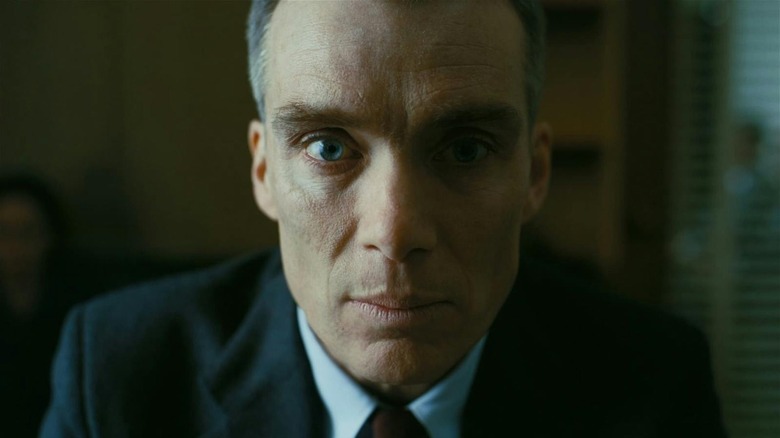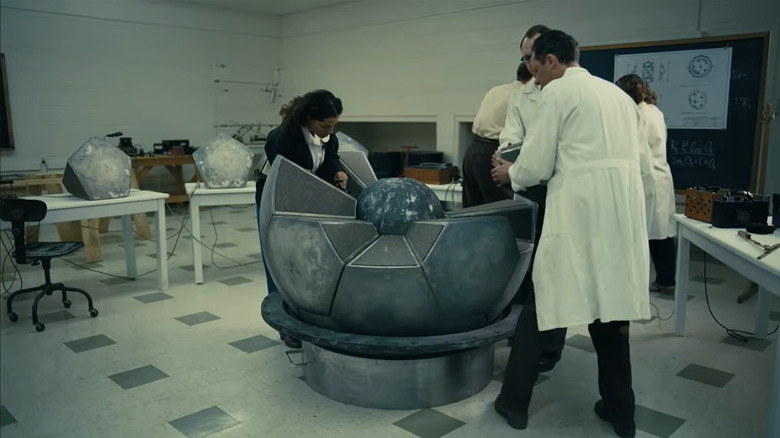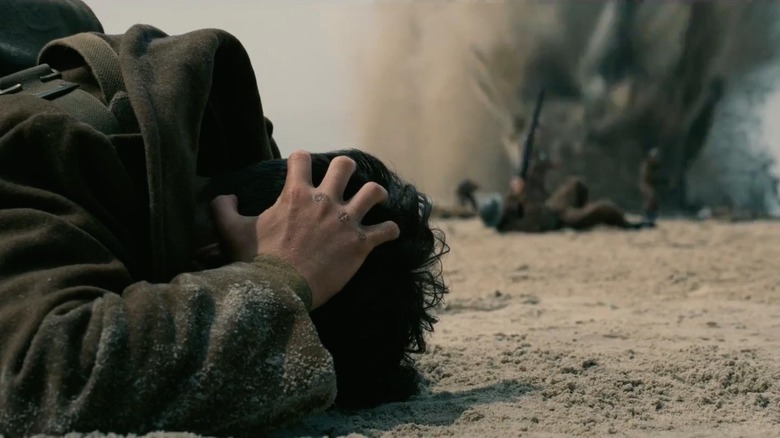How Christopher Nolan Made Oppenheimer On A Budget Of Just $100 Million
One of Christopher Nolan's strengths as a director is just how efficient he is. Whereas some directors are famous for their long, chaotic production schedules, Nolan's films tend to be finished within budget and ahead of schedule. It's part of how he somehow managed to release "Batman Begins" and "The Prestige" within a year of each other, and also how he managed to make the star-studded, three-hour epic "Oppenheimer" under a budget of $100 million. For context, the far less visually impressive "The Flash" cost $300 million.
Considering how star-studded "Oppenheimer" is, and how over-inflated so many other movie budgets have been in recent years, its relatively low budget feels like a miracle. In a recent interview with Vanity Fair, however, lead actor Cillian Murphy talked about how miracles had nothing to do with it:
"I think every single crew member, every single actor wants to be on a Chris Nolan set [...] like Robert [Downey Jr.] was saying, there's a lot of wasted time, wasted money that surrounds our industry. Everybody knows that, it's legendarily so. But with Chris it isn't, and you just go straight to the work. And I think the reason he recollaborates a lot with people is that he likes to do that thing where it's just the work."
Much has been made over the years of Nolan's approach of not allowing chairs on set, but it's not the only thing Nolan doesn't like. Murphy described cell phones on set as being another thing considered a waste of time. "Why would you be on your phone on a film set? Doesn't make any sense," he said. Robert Downey Jr. concurred:
"Everything's happening in front of the camera. There is no budget for anything that's not happening in front of the camera."
Cutting down the schedule
Time is the most important part of keeping a movie's budget under control; every day of production is another day you have to pay the crew. "Oppenheimer" was originally supposed to take 85 days to film, but Nolan reorganized the whole production schedule and managed to "cut it down by at least 30 days," according to Variety. The shorter schedule meant he had more spending money to "reconstruct Los Alamos from scratch in New Mexico," as well as film at Berkley for the scenes where Oppenheimer lived and worked there.
The film's executive producer Tom Hayslip was originally resistant to letting Nolan both build a fake town and film all over the country. "We want to shoot in New York and New Jersey and Berkeley and Los Angeles and New Mexico," production designer Ruth De Jong recalled, which was considered a tall order. But then Hayslip changed his tune once he saw the sheer amount of days Nolan had cut from the production schedule.
"That is a lot of money we get back!" De Jong explained. "At that point, you feel like, 'I have to deliver above and beyond because he just went and gave up his days.'" Sure enough, Nolan received most of what he asked for, with the only real concession being that he couldn't film on location in Washington D.C. "Nolan was not permitted to shoot in actual government buildings in D.C.," per Variety, so he had to film those scenes in New Mexico instead. In the end, "Oppenheimer" wasn't just finished within budget and ahead of schedule; it was within budget largely because it was ahead of schedule.
How it compares to Nolan's previous movies
"Oppenheimer" ended up being filmed in under 60 days, which is faster than the 96 days that went into "Tenet" and the 68 days that went into "Dunkirk." Most of Nolan's big-budget movies before that, from the "Dark Knight" trilogy to the ambitious "Inception" and "Interstellar," took even longer.
While those movies' longer production schedules might sound obvious, as they're much bigger blockbuster action films, they also have the advantage of centering around a larger cast of characters. Whereas Christian Bale gets a surprisingly low 35 minutes of screentime throughout "The Dark Knight," there are barely any scenes in the entirety of "Oppenheimer" where Cillian Murphy isn't front and center. This means there was far less room for error; any common illnesses like a cold or flu for Murphy could've cost a lot. There also wasn't as much room to film scenes simultaneously in different locations (as the sprawling "Game of Thrones" was famous for doing).
It all still worked out for Nolan, Murphy, and the rest of the cast and crew. Not only does the film look and sound great, but it went on to make nearly a billion dollars at the box office. For a film like "Avatar: The Way of Water," this would be considered a borderline flop due to how expensive the production was, but because "Oppenheimer" was made on such a comparatively low budget, this near-billion is considered a massive success. We at /Film have long argued that Hollywood needs to stop making movies with budgets as high as they've been lately, and Nolan is making the best case in our favor. A movie doesn't need to cost over $200 million to become a cultural phenomenon, and "Oppenheimer" just proved it.


